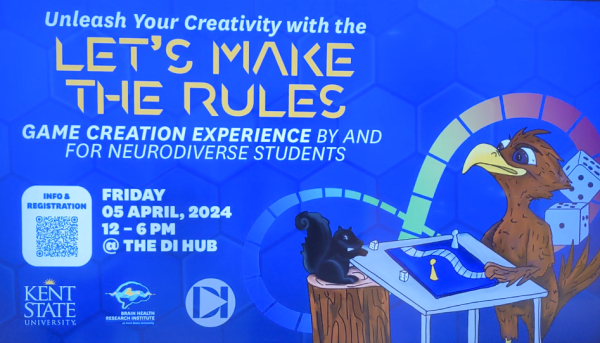When is enough, enough?
September 26, 2006
Underage drinking can result in more than arrest: Alcoholism lasts a lifetime
Alcoholism is a chemical dependency, and symptoms include misjudging priorities, loss of control and drinking at inappropriate times. PHOTO ILLUSTRATION BY BRIAN MARKS | DAILY KENT STATER
Credit: John Proppe
Underage drinking happens in college. It’s a well-known fact, but college alcoholism can often go unrecognized and untreated.
According to information from the BACCHUS and GAMMA Peer Education Network, a campus-based group that strives to promote healthy collegiate lifestyles and positive decision making, there are nine symptoms of chemical dependency. If a person exhibits three or more of these symptoms, there is cause for concern.
Such symptoms include loss of control, excessive substance use, excessive time spent using and recovering from the alcohol use, drinking at inappropriate times, misjudging priorities, misjudging problems, building a tolerance, experiencing withdrawal and using alcohol to relieve health problems.
The bottom line, according to Rob Young, outpatient services manager at Townhall II, an organization in Kent that offers substance abuse treatment to Kent State students and to the Kent community, is that “drinking causes problems,” and if a person continues to drink despite the problems that it causes, alcoholism may be an issue.
“Alcoholism is a disease that affects the entire person, including both the mind and the body,” Young said. “It is dangerous because it interferes with decision-making and logic no longer dictates one’s actions.”
Though such consequences of alcohol misuse are a great danger to anyone, they are more of a concern among underage and college students.
Young said that first and foremost, underage drinking is against the law. Underage students who drink can face much more than legal consequence, though, if they are not careful.
“When people start messing around with alcohol and drugs at a young age, it affects them worse than adults,” Young said.
Alcoholism sticks with people for their lifetime. For example, chemical dependency can be fatal, cause victims to live shorter lives and cannot be permanently cured.
However, specialists can stop and treat the addiction if one is willing to admit his or her problem.
“Denial is one of the main characteristics of alcoholism because the disease wants you to drink,” Young said.
If a problem is suspected, he suggested coming to Townhall II and taking the necessary steps for the disease to be diagnosed and treated.
“We offer individual assessments, group counseling and screenings,” he said.
There are also many services on campus that address alcoholism and drinking.
According to Kathy Biser of Psychological Services in the DeWeese Health Center, her group offers individual therapy for those who may be suffering from alcoholism.
Also, students have opportunities to become directly involved in promoting safe drinking.
“Last year for BACCHUS, we set up information tables in the Student Center during National Collegiate Alcohol Awareness Week,” sophomore chemistry major Andrea Premraj said. “We also offered alcohol screening and had a safe spring break week as well.”
This year National Collegiate Alcohol Awareness Week is scheduled for Oct. 16-20. Each day of this week, information about alcohol use will be available to students from 11 a.m. to 2 p.m. in the Student Center.
Contact features correspondentChristina Stavale at [email protected].























